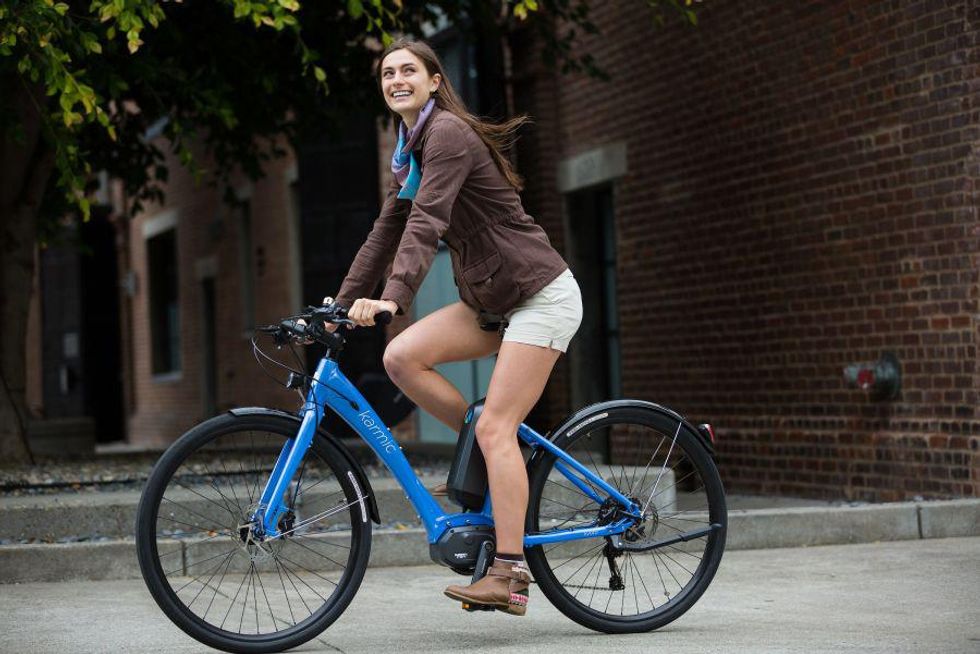Unknown by the public, ignored by politicians and despised by many cyclists, electric bicycles (or, rather, assisted pedaling) remain unexploited in Spain, although they are becoming more and more frequent on mountain roads and, for more than one expert, they are the perfect solution to move in many cities. We clarify how the sector is and we give twelve keys to choose an electric bicycle.
Lighter, more reliable, and cheaper. More autonomous. And, of course, more similar to a conventional bike. Technological advances, the proliferation of cycling infrastructures, respect for the environment, and the inconveniences of the daily use of the car augured a bright future for the pedal-assisted bicycle. In part, these forecasts are being fulfilled: reports such as Navigant Research say that 35 million e-bikes were sold in the world in 2016, generating a business of 15,000 million euros (it will be 24,000 million in 2025). But the figures are not so buoyant in Spain, where the sector is growing (24,604 electric bicycles were sold in 2015, 39% more than in 2014) but it is still far from neighboring countries.
Little culture and disastrous measures
Alejo Bastos created Biobike more than eight years ago, a specialized electrical shop in Madrid. Although its sales are growing every year, Bastos says that in 2016 the business slowed down, among other things, because the city power market has still not taken off. "In Spain, there is no urban cycling culture," he says, "because people identify the bike with leisure and not as a means of transport." Ana Amondo, head of Motor Verde (the largest electrical outlet in Spain has just opened in Bilbao) explains that they sell more machines, but that few are from the city. "People ask, above all, for mountain bikes", he assures, "especially models of almost 3,000 euros, because users in this sector want the best components. Urban are sold less and, in addition, the price is looked at much more ".
"People identify the bike with leisure and not as a means of transport"
A price that, although replacing cars and motorcycles with e-bikes would be of enormous social interest, still does not receive effective subsidies. Proposals such as the Movea Plan (which returned 200 euros of the final price of an electricity company) were a failure: the process was so cumbersome that even stores and brands ignored it because it discouraged their customers. "It was the biggest shit in the history of grants," explains Bastos with humor and some frustration.
"The stores had to advance the money to the customer, and the ministry gave it to us a year and a half later. Decapitalized many businesses ". For Fernando Martín, manager of the online store Biciclick, "It was disastrous. It involved serious management problems and was based on very cumbersome procedures ". And Amanda, who describes the ministerial aid as "disastrous", explains that even the subsidy from the Basque Energy Agency involves "a lot of noise and little nuts. It generates more problems for stores than benefits and does not stimulate hot buying ".
The Secretary-General of AMBE, Carlos Núñez, recognizes that "the difficulty of managing the enormous administrative work" penalized the PIMA or MOVEA plans, and is committed to changing the model. "Entities such as the Institute for the Diversification and Saving of Energy ( IDAE ), which have helped municipalities to implement public bicycles, could allocate funds for municipalities to help citizens directly," he says.
Good for everyone
But the assisted pedaling bicycle is not only mistreated by politicians: the majority of citizens, even many regular cyclists, continue to ignore and even "despise" them, understanding that they are not real bicycles. Most mistakenly believe that pedaling is not even necessary, and many consider them "camouflaged motorcycles" and a sign of laziness. Yuriy Tomas, Marketing Manager at Specialized, knows that there is a sector of "purists" who do not consider bicycles, but explains that "the market increasingly demands this type of vehicle. The assistance, its easy handling, and the fun they provide bring the bicycle closer to many people who, for different reasons, did not consider pedaling before, and that is good for everyone. It is not about choosing one or the other or arguing about whether you exercise more or less with them. We do not have to enter into that absurd struggle: that each one of us does with their bike what they like the most, whether it be suffering going up a pass or doing kilometers up the mountain on an e-bike ".
Twelve electrical keys
- The regulations are clear: the motor of anelectric bicycle cannot exceed 250W, and the assistance must be "cut off" when the vehicle reaches 25km / h. And, although many still do not know it, you have to pedal: if you don't, the e-bike won't move.
- The main technological advances are focused on increasing the autonomy and reliability of the batteries, improving the reaction and torque of the motors, and improving connectivity: many manufacturers have developed applications that allow better management of the battery or share the data of the trip through the network.
- Skeptical at first, conventional stores are beginning to "put the batteries" with the electric ones. Business rules.
- Customers increasingly prioritize quality. The price, of course, matters, but also receive a guarantee, the reliability, quality of the components, smoothness of use, low noise level, or maximum autonomy.
- Bosch, Yamaha, Shimano, Brose, Panasonic… The best-known motor and battery brands offer quality sets, but the sensations offered by each firm vary. Always go to a specialist to find the model that best suits your needs and preferences.
- The rise of the bicycle in sectors such as courier and delivery, and the proliferation of cargo bikes will generalize the use of e-bikes. Companies such as Telepizza or Burger King already collaborate with Spanish electricity brands such as Quipplan.
- Although some firms offer futuristic and stunning machines, our market is still "very green" for revolutionary proposals. Fear of theft and low purchasing power means that, at least when it comes to city bikes, functionality is prioritized.
- The electric bike business is different from that of the conventional bike: the customer needs closer proximity, good after-sales service, and more advice when choosing their ideal model.
- The proliferation of shared electric bicycle systems (such as those of BiciMAD or some Bicing) is positive. In the medium and long term, they help popularize this type of vehicle and are a good showcase to show their potential, reliability, and efficiency.
- In Holland 16 e-bikes are sold for every thousand inhabitants, in Germany, 6 for every thousand inhabitants. The figures in Spain are very far: 0.5 electric bicycles for every thousand inhabitants.
- To publicize the advantages of this type of vehicle, AMBE will launch the E-Bike Days from this year. They will be events in the center of cities such as Madrid, Barcelona, Valencia, Vitoria, Bilbao, or Malaga where, in addition to showing models, citizens will be able to try them out. The first has already been held and was a resounding success.







 Photo by
Photo by 

 Photo by
Photo by  Photo by
Photo by  a group of people sitting around a table with laptopsPhoto by
a group of people sitting around a table with laptopsPhoto by  people on beach during daytimePhoto by
people on beach during daytimePhoto by  Photo by
Photo by 



